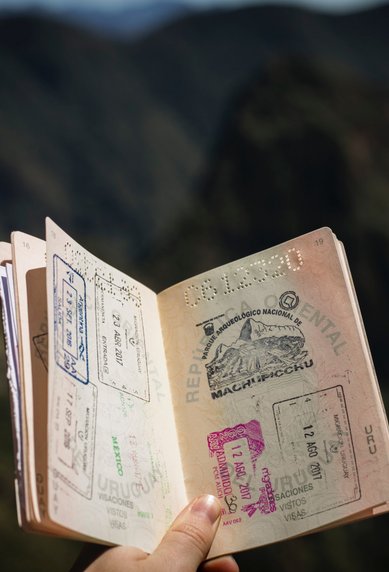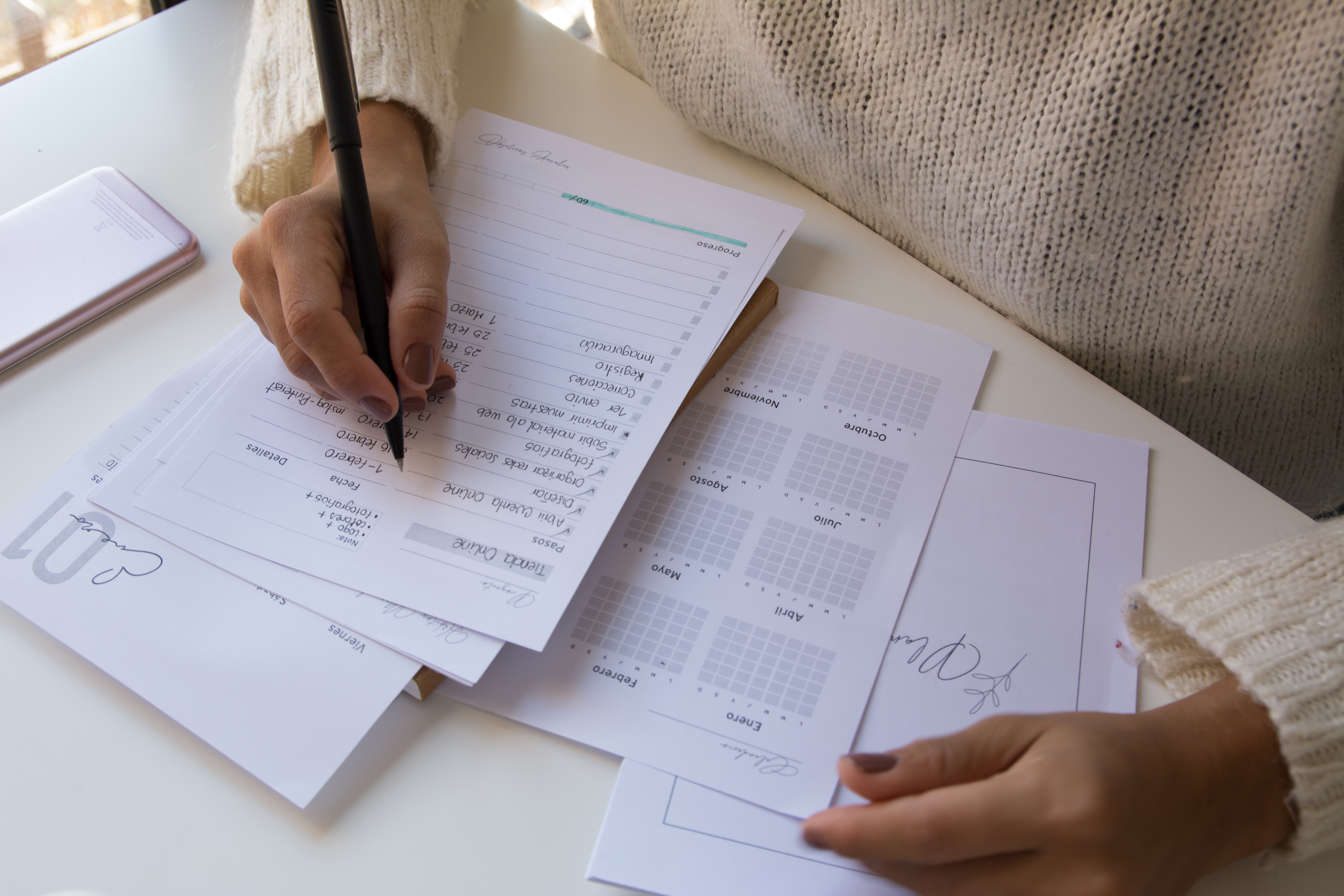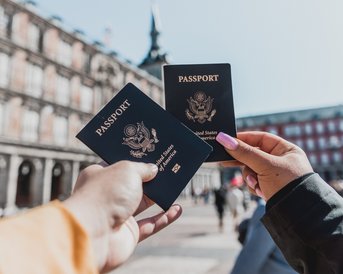

Welcome to Germany
Have you received your letter of admission? Then it's time to start planning your study abroad programme at the SRH Berlin University of Applied Sciences. An important milestone is your visa.
Submit your application as early as possible, because it can take several weeks or months until you get an appointment for the application, which varies greatly depending on the embassy. The processing time for your application can also take several months. The sooner you can take care of it, the better.

What documents do I need for my visa?
The documents you need for the study visa are almost the same everywhere; depending on the country, the documents may be slightly different or you may need additional papers. Therefore, visit the website of the German Embassy where you will apply for the visa to make sure you have all the information.
The typical documents are the following:
- Letter of admission from SRH
- a valid passport with at least two free pages
- a recent passport photo (note if there are any special requirements for the photo, e.g. light background or similar)
- Proof of funding, preferably a blocked account, scholarship certificate or similar, and
- some further application documents, e.g. travel insurance or already a German health insurance
Who needs a visa?
Actually, everyone who wants to stay in Germany for longer than three months. However, there are a few exceptions, which you can find on the right-hand side.
If you are not sure whether you need a visa or not, check with the German Embassy in your home country or the country where you live.
If you are from an EU or EEA country (Iceland, Liechtenstein and Norway), you do not need a visa. If you want to live in Germany for longer than three months, you only need to register as a resident of the city in which you will be living (see the information on registration). German students must also register, either with their parents or in their new home.
If you are from Andorra, Australia, Brazil, El Salvador, Great Britain, Honduras, Israel, Japan, Canada, Monaco, New Zealand, San Marino, South Korea, Switzerland, USA or Switzerland -then you do not need to apply for a visa, but you will receive a stamp in your passport when you enter the country, which is a visa.
You must also register in your new home and apply for a residence permit within three months of entering the country.
Even if you are already studying in an EU country, you will probably need a visa to continue your studies in Germany. If you have been living in the EU country for a longer period of time, you probably do not. Please enquire on the website of the German embassy. Ask as early as possible or, if necessary, apply for the visa as early as possible due to long waiting times.

Which visa do I need to apply for?
Please apply for a national visa for study purposes (D-Visa) if you would like to study at SRH Berlin for at least one semester (6 months). There is also a visa for study application or a visa for language acquisition; if you have been admitted to us, then apply for the visa for study purposes.
You cannot apply for a Schengen visa to enter Germany for the start of your studies; this is only possible for tourism purposes or short courses (summer school and similar). A Schengen visa will never be converted into a residence permit. If you have applied for a Schengen visa, you can enter the country, but you have to leave within 90 days and then you have to wait 90 days before you can apply for a new one. There are situations where this is a temporary solution, but you would still need to apply for a visa for study purposes.
Questions & Answers
Yes, please make sure you have a valid entry visa or residence permit. If you have a visa, apply for a residence permit six to four weeks before your visa expires; our Residence Permit Service can advise you on this.
For students who want to take their family with them, there is unfortunately hardly any information on the websites of the German embassies. Ask them directly; this is the safest thing to do because the requirements can differ from country to country.
Sometimes you can add family members to the application for a study visa for yourself.
In any case, you will need various documents from your family members, e.g. passports, passport photos, birth certificates of your children, marriage certificates, etc. In most cases, you will need the original. In most cases you will need the original, a certified copy and an official translation into German; sometimes an English translation is sufficient, please enquire.
It is important that you have enough money per person travelling with you to ensure that you are financially secure. The easiest way is to pay an appropriate amount into the blocked account.
If you later apply for a residence permit to study in Germany, you will also need to apply for a residence permit for your family members. Again, you will need all the documents in German translation for each family member. In most cases, these are the same documents that you submitted for the visa. In addition, you will need new documents, see our information on residence permits.
Usually it is 90 or 180 days, i.e. three to six months. It depends, for example, on what kind of health insurance you bring with you when you apply for the visa. If you already have health insurance from Germany, you usually get a visa for six months, sometimes even for a year.
Regardless of how long your visa is valid for, you will apply for a residence permit about six to ten weeks before your entry visa for study purposes expires.
Some students, especially Exchange/Study Abroad Students, are often granted a visa for study purposes for up to 12 months. If you leave again within this period, you do not need to apply for a residence permit. If you want to stay longer than originally planned, i.e. two semesters instead of one, you will unfortunately have to apply for a residence permit.
If you do not need an entry visa for Germany, e.g. because you have South Korean or British citizenship, apply for a residence permit within the first 90 days of your entry into Germany. Please check the stamp in your passport to see when your visa expires and make a note in your calendar to submit the relevant documents to the appropriate office six to four weeks before your entry visa expires. See here for information on applying for a residence permit.
All students applying for a visa for study purposes must prove that they can finance their life and studies in Germany. Unfortunately, a letter from a sponsor, e.g. your parents, is not sufficient. You can find the details on the website of the German embassy to which you are applying.
Typically, the following proofs are usually accepted without any problems:
- Proof of income or assets from your parents (=> this is not the case everywhere, please note the information provided by the embassy).
- Guarantor or guarantor with permanent residence in Germany
- Security payment into a blocked account
- Bank guarantee
- Scholarship notification from a recognised scholarship provider, e.g. DAAD, Fulbright
As already mentioned, visa regulations of the German embassies can differ from country to country when it comes to financial proof. In many countries, a blocked account is often the only financial proof permitted. Therefore, please contact the German Embassy in your home or study country as early as possible if you have any questions about this.
We will discuss this in more detail here. This is an account into which you deposit money, but which you cannot freely dispose of; for example, you can only have a certain amount of money transferred to a current account once a month. Therefore, it serves as security for third parties, for example, for the German Embassy when you apply for a visa or for the Foreigners' Registration Office in Germany where you later apply for a residence permit.
So before you can apply for a visa or a residence permit for the first time, you transfer a certain amount of money to the blocked account and show that you can finance your life and studies in Germany. The German state wants to prevent students from getting into financial difficulties and having to apply for state support.
That's why you pay the entire amount for one year when you apply for a visa for study purposes, or less if you already know that you will be staying in Germany for less than twelve months.
If you later apply for a residence permit, you should refill the blocked account so that it covers at least one year, i.e. contains at least XY euros. Currently, this is at least 11,208 euros for one year; then you may withdraw or debit a maximum of 934 euros per month. If you pay more than the minimum amount into the blocked account, you can dispose of it freely. If you leave Germany earlier and you still have money in the blocked account, you will get the remaining balance back.
There are many banks that offer this service, in Germany and certainly also in your current home country. Not all banks are accepted by the German authorities, but you can certainly find a list of accepted banks on the website of the German embassies. Important: these lists are not a recommendation by the German embassy as to which bank is the best, but an alphabetical list.
Important: make sure you check whether the blocked account is offered in a package with other services, e.g. travel health insurance or health insurance. If you don't want it in the package, then make sure to click off these services.
Yes, the Immigration Office should be informed at the appropriate moment. If you changed in the first or second semester, it is relatively easy to explain it to the LEA. However, if you decide to change your course of study in the higher semesters, then it becomes complicated to justify the change. The change of university should be made as soon as you are enrolled at your new university. However, you do not have to declare the change of study programme until your residence document expires.